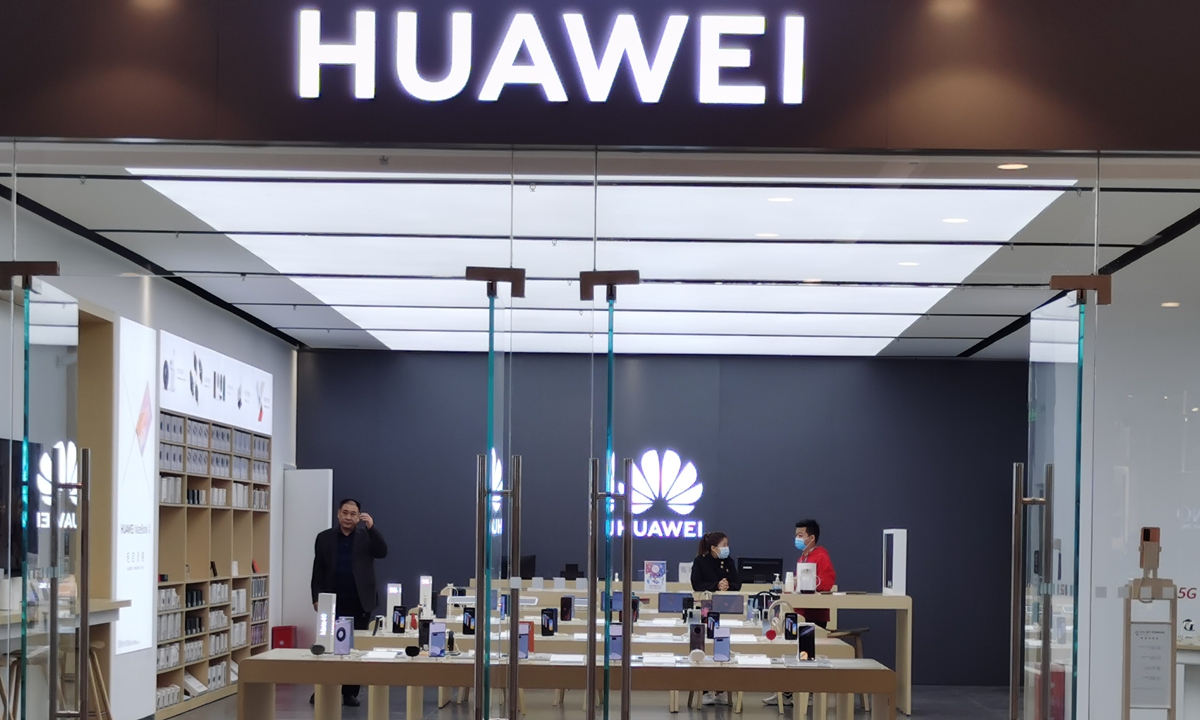
A view of a Huawei store in Central China's Henan Province in November 2020 Photo: cnsphoto
A Swedish court on Tuesday upheld a ban on Huawei selling 5G network gear in the country. The move, widely believed to be a politicized decision, will not only delay global 5G deployment as Huawei is a major vendor, but may also put the future of Ericsson China operations at serious peril, industry analysts said.
A Swedish court upheld a 5G sales ban against the Chinese telecommunications provider, giving the Swedish Post and Telecom Authority (PTS) the right to shut Huawei out of the country's 5G mobile networks.
The reason for the court ruling is considered "vague" - it cited possible "national security" risks.
The court's chairman Ulrika Melin said that Sweden's security is a "weighty reason" and the administrative court has taken into account that only the country's Security Police and the Armed Forces together have an overall picture regarding the security situation and the threat against Sweden.
The PTS failed to produce any tangible evidences to demonstrate that Huawei's 5G gear has security issues, and the latest court ruling in the country against the Chinese company's 5G gear is disappointing, but the Chinese high-tech company will continue to pursue its legitimate rights on the issue, Huawei told the Global Times on Wednesday.
The judgment is under review, along with "the court's reasoning to determine what further legal remedies to pursue to protect the company's legitimate rights and interests," and "our door remains open to constructive dialogue with relevant parties to work out practical solutions to mitigate any security concern," a Huawei spokesperson said.
Sweden itself is not a big market for Huawei, but it's critical for the company to continue to appeal to the court system for a further decision to prove it's clean," Xiang Ligang, director-general of the Beijing-based Information Consumption Alliance, told the Global Times on Wednesday.
Xiang added that the ban is also a mixed result of US government pressure as well as rivalry among various political forces in Sweden, and Swedish industry surely doesn't want to see the result.
In Tuesday's ruling, the PTS failed to produce any facts or evidence to demonstrate that Huawei's equipment has technical security issues, Huawei's spokesperson said, noting that rather, in submissions to the court, the PTS clearly stated that it "has no basis for claiming that there are proven technical vulnerabilities in equipment or software from Huawei."
"We encourage relevant Swedish authorities to rely on objective, unbiased and verifiable cyber-security standards based on facts," the spokesperson added.
In October 2020, Swedish telecom regulator PTS unexpectedly banned Huawei from supplying 5G equipment to Swedish telecom companies due to so-called security concerns raised by Sweden's security service SAPO, a decision that the Chinese company challenged in court.
An Ericsson statement on May 24 this year said that the PTS decision "may adversely impact the economic interests of Sweden and Swedish industry, including those of Ericsson," adding that the geopolitical tussle can have consequences for the entire industry, with an increased likelihood of further industry splits, separation of global value chains and separation of global standards for mobile telecommunications.
The Global Times exclusively learned from a source close to the matter on May 10 that Chinese mobile operators invited Ericsson to participate in their 5G equipment testing, offering the Swedish vendor an opportunity to "interview" for access to China's 5G market. It could be the last chance for Sweden to reverse its incorrect decision of excluding Chinese companies such as Huawei from participating in its 5G construction.
Cui Hongjian, director of the Department of European Studies at the China Institute of International Studies, told the Global Times on Wednesday that the lack of solid evidence for banning Chinese companies may eventually put Swedish companies such as Ericsson at risk.
"If Sweden bans Huawei citing so-called national security grounds, China can do the same to Swedish companies," Cui said.
Cui also suggested the government formulate a law-based response mechanism to counter some countries' reckless crackdown on Chinese companies, so that China can fight back in a rule-based and timely manner.
The latest move from Sweden comes as European countries tighten controls on Huawei in their 5G network construction under diplomatic pressure from the US. However, they so far cannot find any substitutes for Huawei gear - which offers far lower prices than Nokia and Ericsson.
The ban on Huawei was not based on facts and had no legal basis, but it was a politicized decision to which China resolutely objects, Gui Congyou, the Chinese Ambassador to Sweden, told local newspaper Expressen in mid-May, urging Sweden to "quickly correct its mistakes."
The Huawei decision is dominated by political considerations, while rising costs and a delayed 5G rollout will be the result for countries that decide to ban Huawei, according to Xiang, a close Huawei follower.
"These countries will taste the 'bitter fruit' when large-scale 5G deployment begins, and thus may turn back to Huawei," said Xiang.




